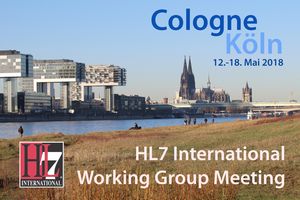Mark your Calendar: HL7 International Working Group Meeting, May 12-18, 2018
Back in Cologne!
Some of you may remember our last Working Group Meeting in Cologne in 2007. After Noordwijkerhout the year before in the Netherlands, it was the second WGM not taking place on the American continent and the start of a series of so-called “international” meetings. This time we meet in “Köln” from May 12–18, 2017.
Concluding the plans to go back to Cologne took the meeting team almost four years. Several non-Germany destinations were discussed, as well as other German cities like Berlin. Eventually we are back in the Maritim Hotel in the middle of Old Town next to the river Rhine.
Back in history (not only 10 years)
Cologne was founded as “Oppidum Ubiorum” in 38 BC by the Ubii, a Germanic tribe. In 50 AD, the Romans founded “Colonia” (=colony) on the Rhine, the city was named “Colonia Claudia Ara Agrippinensium”. Cologne later became the provincial capital of Germania Inferior as part of the Roman Empire.
Later in the middle ages, Cologne was influenced by the French culture becoming a city of East Francia in 843.
And today?
Roman relicts can still be found everywhere in the town. You want a tip: consider doing a visit not in the Catherdral (Dom) but under the Catherdral where the ruins have recently been turned into a museum which takes you away through the centuries of history. You’ll find the stones breathing, I swear. See [1] for more information.
As described, Cologne is multi-culturally influenced since ever and may be that is one of the reasons why people live here among the different cultures mostly with a good spirit of tolerance and the evidence that the variety of cultures is an addition to one’s own life.
And also from an architectural perspective, Cologne has changed since 2007: we now have so-called Crane-houses along the newly designed harbor area (see title picture). Just one of many more changes in the last 10 years.
Traveling
Cologne has an airport (Köln/Bonn, CGN) that is reachable through many larger airport hubs in Europe. You may also consider flying directly to Frankfurt/Main (FRA) and then take the High-Speed-Train ICE directly from the airport up to Cologne main station in less than an hour. The Maritim Hotel is close to the main station. Being a kind of the center of West Europe, Cologne is also a good hub for investigating other locations in Europe, like the Mediterranean or Scandinavian countries. Be curious.
Meetings
This time we are happy regarding the meeting space. While we had to split up into two hotels in 2007, in May 2018 all meetings are located in the Maritim Hotel. This makes logistics a bit easier. The Networking Reception though, is planned to be at a location outside the Hotel, stay tuned ;-)
On Monday morning, May 14, a half-day plenary is planned to talk about European Health-IT perspectives and achievements and their alignments and symbiosis with initiatives anywhere else in the world.
Kölsch? Kölsch!
Just a reminder to learn the word “Kölsch”, as well-pronounced as possible. I know it is not easy to pronounce the “ö” for non-German speakers but if you get it you learned one word with three meanings in a row:
- Kölsch is the typical local beer, smooth and easy-going down your throat (be careful); it is served in small glasses (tubes) for frequent fresh refills. Yummy, “ein Kölsch, bitte”, to order one.
- Kölsch is also the language, actually the dialect they speak here; it reflects a lot of the culture here in words and expressions.
- Kölsch is also the life style; due to the variety of cultures that influences this city, living here means to be tolerant, to take it easy to make friends and become friends (well, maybe not always for live time, but anyway), to love to communicate and chat. “Köln du bist ein Gefühl”, is a famous local song, “Cologne, you are an emotion”.
I am sure that there would exist distinct SNOMED codes for all three of them, but for normal life and human interoperability “Kölsch” does the miracle.
More?
To learn more about the vibrant city you may of course visit Wikipedia [2] where you also can listen to the word Köln (to exercise the “ö”). You may also watch a TV-gem: a video [3] that our colleagues from England (Connecting for Health) compiled with their impressions from the Cologne meeting back those days in 2007. And for who is interested in the original Onsite Guide of 2007, it is still online, see here [4].
References
[1] https://www.koelner-dom.de/index.php?id=19167&L=1
[2] https://en.wikipedia.org/wiki/Cologne
[3] https://www.youtube.com/watch?v=saVQ1Onn7aU
[4] Onsite Guide
And by the way: we are also seeking for sponsorship, please visit [5] for more information.
Dr Kai U. Heitmann
CEO, HL7 Germany
